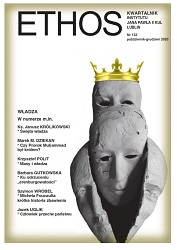Rozpad władzy jako konsekwencja upadku mitologii. Obrazy końca systemu komunistycznego w korespondencji Jerzego Giedroycia i Witolda Wirpszy z lat 1981-1985
Disintegration of Power as a Consequence of the Collapse of a Mythology: Images of the Decline of the Communist System in Jerzy Giedroyc’s Correspondence with Witold Wirpsza (1981–1985)
Author(s): Dariusz PawelecSubject(s): Political history, Government/Political systems, Post-War period (1950 - 1989), History of Communism
Published by: Katolicki Uniwersytet Lubelski Jana Pawła II - Instytut Jana Pawła II, Wydział Filozofii
Keywords: Witold Wirpsza; Jerzy Giedroyc; communist system; mythology; set of ideological myths; Solidarity; martial law; Kultura; the collapse of the Soviet Empire;
Summary/Abstract: Based on an analysis of the correspondence between Jerzy Giedroyc and Witold Wirpsza (continued from1981 to 1985), the article relates the agony of the communist government in Poland, triggered already decades earlier by the fact that the ideology supporting that political system fell into a gradual decline. The author of the paper explores how Leszek Kołakowski’s idea that “the crisis of the communist consciousness did not come about through lack of new knowledge about the world; it came about through the collapse of the mythology which gave shape to that knowledge,” expressed in his essay “The Death of Gods,” is reflected in the letters in question. In their open dialogue, exchanging pieces of information, as well as pure speculation, Giedroyc and Wirpsza, both living outside Poland, the former in Paris and the latter in Berlin, describe the decay and disintegration of the communist rule not only in Poland, but all over the Soviet Empire. Having examined the epistolary material, the author of the paper reconstructs the history of the gradual fall of the system employed in the former communist countries to organize the social (mental as well as moral) consciousness so that an explanation of facts inconvenient to the government could always be found within the body of its ideological myths. The intellectual exchange between Jerzy Giedroyc, editor-in-chief of the Polish-émigré journal Kultura in Paris, and Witold Wirpsza, a brilliant poet and essayist who frequently contributed papers to Kultura, shows that the foundation myth of the communist rule was in time losing its credibility and that the authors of the studied letters were of the opinion that the communist government could merely apparently justify its actions by reference to the ideology. A reading of the letters in question, which are rich in political analysis and include numerous polemics around literary works as well as around events of the time, not only shows that they stem from the historical context in which they were written (the time of martial law in Poland), but is also an opportunity to reconstruct the rhetorical perspective they exhibit. The author of the paper explores how the facts-based discourse the letters express is subjected to figurative literary techniques and points out that the image of the decay of the communist rule they convey falls into the convention of figural realism.
Journal: Ethos. Kwartalnik Instytutu Jana Pawła II KUL
- Issue Year: 33/2020
- Issue No: 4
- Page Range: 176-191
- Page Count: 16
- Language: Polish
- Content File-PDF

